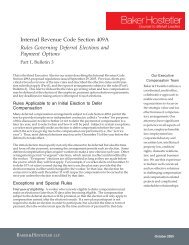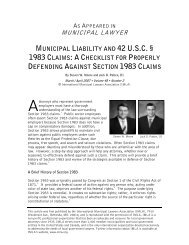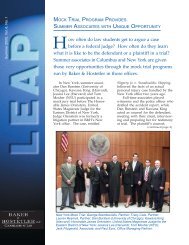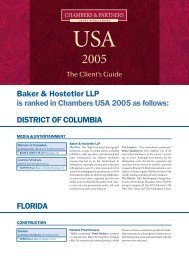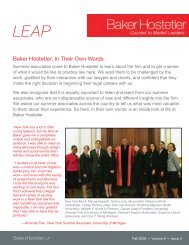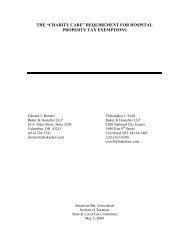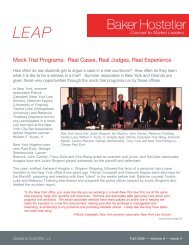Civ. P. 700a. In addition <strong>to</strong> the statu<strong>to</strong>ry language required on the Writ itself, the copy that isserved on the Deb<strong>to</strong>r must <strong>in</strong>clude the follow<strong>in</strong>g:Tex. R. Civ. P. 700a.To ___________ Defendant:"You are hereby notified that certa<strong>in</strong> properties alleged <strong>to</strong> be claimed byyou have been sequestered. If you claim any rights <strong>in</strong> such property, youare advised:YOU HAVE A RIGHT TO REGAIN POSSESSION OF THE PROPERTYBY FILING A REPLEVY BOND. YOU HAVE A RIGHT TO SEEK TOREGAIN POSSESSION OF THE PROPERTY BY FILING WITH THECOURT A MOTION TO DISSOLVE THIS WRIT."9. S<strong>to</strong>rage of the PropertyThe officer acts neither as the agent or the servant of either party. Multi-Mo<strong>to</strong> Corp. v.ITT Commercial F<strong>in</strong>ance Corp., 806 S.W.2d 560, 569 (Tex. App.—Dallas 1990, writ denied).After seizure, the levy<strong>in</strong>g officer must keep the seized property <strong>in</strong> a secure place for at least 10days. Tex. R. Civ. P. 708. Dur<strong>in</strong>g this time period, the officer has an obligation <strong>to</strong> secure theproperty. Tex. Civ. & Prac. Rem. Code §34.061. The officer is required <strong>to</strong> care for and managethe sequestered property <strong>in</strong> a prudent manner while he reta<strong>in</strong>s cus<strong>to</strong>dy. Civ. Prac. & Rem.Code § 62.061. If the officer entrusts the sequestered property <strong>to</strong> another person, the officer isresponsible for the acts of that person relat<strong>in</strong>g <strong>to</strong> the property. Id.The officer is liable for <strong>in</strong>juries <strong>to</strong> the sequestered property result<strong>in</strong>g from his neglect ormismanagement or from a negligent or mismanagement of a person <strong>to</strong> whom he entrusts theproperty. Civ. Prac. & Rem. Code §62.061. If the property is damaged, the officer and hissureties are liable for the value of the property lost or the amount of the <strong>in</strong>jury susta<strong>in</strong>ed, plusten percent of the value of that amount. Id. The claim aga<strong>in</strong>st the officer may be filed <strong>in</strong> anydistrict court that has jurisdiction over the parties. Freeman v. Wirecut E.D.M., Inc., 2005 Tex.App. LEXIS 1227, (Tex. App.—Dallas 2005, no pet.) The claim should be made aga<strong>in</strong>st theofficer <strong>in</strong>dividually and not <strong>in</strong> his or her official capacity. Id.The officer is entitled <strong>to</strong> just compensation and reasonable charges as <strong>to</strong> be determ<strong>in</strong>edby the clerk that issued the writ and shall be taxed and collected as costs of suit. Civ. Prac. &Rem. Code § 62.062. The officer may reta<strong>in</strong> possession of the property until he is repaid formoney expended <strong>in</strong> the security, management, or care of the sequestered property by the partyseek<strong>in</strong>g <strong>to</strong> replevy the property or that party's agent or at<strong>to</strong>rney. Civ. Prac. & Rem. Code §62.063. Dur<strong>in</strong>g the time the levy<strong>in</strong>g officer has possession of the property, the party secur<strong>in</strong>g thewrit has no right <strong>to</strong> disturb the officer's possession of the property. Tolbert v. McSwa<strong>in</strong>, 137S.W.2d 1051, 1054 (Tex. Civ. App.—El Paso 1939, no writ).10. Deb<strong>to</strong>r's Response <strong>to</strong> a Writ of Sequestrationa. In GeneralA Deb<strong>to</strong>r that has received a Notice of Sequestration may respond <strong>in</strong> a number ofdifferent ways. A Deb<strong>to</strong>r may file a Motion <strong>to</strong> Dissolve the Writ of Sequestration, the Deb<strong>to</strong>rmay file a Motion <strong>to</strong> Modify the Bond Amount, the Deb<strong>to</strong>r may file a Replevy Bond, or the<strong>Page</strong> 20 of 36
Deb<strong>to</strong>r may simply chose <strong>to</strong> ignore the Writ of Sequestration and allow for the Credi<strong>to</strong>r <strong>to</strong> ga<strong>in</strong>possession of the property.b. Dissolv<strong>in</strong>g or Modify<strong>in</strong>g the Writ of SequestrationA Deb<strong>to</strong>r whose property has been seized under a Writ of Sequestration can apply forthe Writ <strong>to</strong> be dissolved, vacated or modified and all or part of the property released. Tex. R.Civ. P. 712a. The Motion <strong>to</strong> Vacate, Dissolve, or Modify the Writ must be sworn. Id. It can bebased on any grounds or cause, extr<strong>in</strong>sic or <strong>in</strong>tr<strong>in</strong>sic, <strong>in</strong>clud<strong>in</strong>g a Motion <strong>to</strong> Reduce the Amoun<strong>to</strong>f the Property Sequestered when the <strong>to</strong>tal amount described and authorized by the Orderexceeds the amount necessary <strong>to</strong> secure the Credi<strong>to</strong>r's claim, one year's <strong>in</strong>terest as allowed bylaw and <strong>in</strong>terest on the claim, and costs. Id. The motion must admit or deny each f<strong>in</strong>d<strong>in</strong>g of theOrder direct<strong>in</strong>g the issuance of the Writ of Sequestration except where the Deb<strong>to</strong>r is unable <strong>to</strong>admit or deny the f<strong>in</strong>d<strong>in</strong>g, <strong>in</strong> which case the Deb<strong>to</strong>r shall set forth the reasons it cannot admit ordeny. Id. The motion must be heard promptly, with<strong>in</strong> 10 days after it has been filed. Id. Absentan agreement between the parties, if the Motion <strong>to</strong> Dissolve the Writ of Sequestration is notdeterm<strong>in</strong>ed with<strong>in</strong> 10 days, it should be denied. Breckenridge v. Nationsbank of <strong>Texas</strong>, N.A., 79S.W.3d 151, 156 (Tex. App. —Texarkana 2002, writ denied); Tex. Civ. Prac. & Rem. Code§62.042. The fil<strong>in</strong>g of the motion stays any further proceed<strong>in</strong>gs except for Orders concern<strong>in</strong>gthe care, preservation or sale of perishable property, until the issue has been determ<strong>in</strong>ed at ahear<strong>in</strong>g. Id.; Tex. R. Civ. P. 712a. At the hear<strong>in</strong>g on the Motion <strong>to</strong> Dissolve, the Court mustdissolve the Writ unless the Credi<strong>to</strong>r can prove the grounds relied upon for its issuance. Tex.Civ. Prac. & Rem. Code § 62.043. The Credi<strong>to</strong>r must prove both the facts alleged and thegrounds relied upon for issuance of the writ. Rexford v. Holiday, 807 S.W.2d 356, 358 (Tex.App.—Hous<strong>to</strong>n [1 st Dist.] 1991, no writ). If the Deb<strong>to</strong>r alleges that the reasonable value of theproperty sequestered exceeds the amount necessary <strong>to</strong> secure the debt, <strong>in</strong>terest for one yearand probable costs, the Deb<strong>to</strong>r has the burden <strong>to</strong> prove the reasonable value of the property.Id. The Court may base its decision on uncontroverted affidavits if they set forth facts thatwould be admissible <strong>in</strong> evidence. Id. If the Court's determ<strong>in</strong>ation cannot be based upon theseaffidavits, then the parties must submit evidence. Id. The Court may make all Orders, <strong>in</strong>clud<strong>in</strong>gOrders concern<strong>in</strong>g the care, preservation, or disposition of the property or the proceedstherefrom, as justice may require. Id.; B & W Cattle Co. v. First Nat. Bank of Hereford, 692S.W.2d 946, 949 (Tex. App.—Amarillo 1985, no writ). If the Deb<strong>to</strong>r has filed a Replevy Bond,the Order dissolv<strong>in</strong>g the Writ vacates the Replevy Bond and discharges the sureties. Tex. R.Civ. P. 172a. If the Court orders that the writ is dissolved, the action will proceed as if the writwas never issued. Rexford v. Holliday, 807 S.W.2d 356, 358 (Tex. App.—Hous<strong>to</strong>n [1 st Dist.]1991, no writ). The Deb<strong>to</strong>r does not waive defenses <strong>in</strong> an action by fail<strong>in</strong>g <strong>to</strong> oppose theissuance of a Writ of Sequestration or fail<strong>in</strong>g <strong>to</strong> rebut the Credi<strong>to</strong>r's evidence at the hear<strong>in</strong>g. Id.The determ<strong>in</strong>ations made at the dissolution hear<strong>in</strong>g are not dispositive on ownership of theproperty at issue. Id.If the Motion <strong>to</strong> Dissolve is timely filed and the officer is given notice, the officer mustreta<strong>in</strong> possession of the property until the Court determ<strong>in</strong>es the motion and sufficiency of theBond. Tex. R. Civ. P. 712a. If the Court f<strong>in</strong>ds the bond <strong>in</strong>sufficient, the Writ of Sequestrationwill be vacated and the levy<strong>in</strong>g officer (or Credi<strong>to</strong>r) is ordered <strong>to</strong> return the property <strong>to</strong> theDeb<strong>to</strong>r, unless the Credi<strong>to</strong>r files a sufficient bond. Id. An order <strong>to</strong> preserve property under thecontrol of the court or <strong>to</strong> dissolve such an order is <strong>in</strong>terlocu<strong>to</strong>ry and is not appealable. Rexfordv. Holliday, 807 S.W.2d 356, 357 (Tex. App—Hous<strong>to</strong>n [1st Dist.] 1991, no writ); Monroe v.GMAC, 561 S.W.2d 12, 13 (Tex. Civ. App.—Waco 1978, no writ); Jackson v. Trustmark Nat’lBank, 2008 Tex. App. LEXIS 874, *1-2 (Tex. App.—Hous<strong>to</strong>n [14 th Dist.] 2008, no pet.).<strong>Page</strong> 21 of 36



